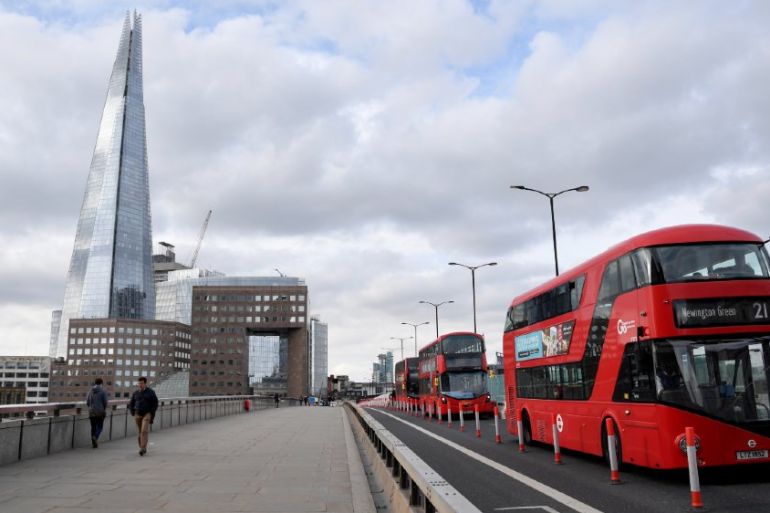UK considers wage cut for furloughed workers: report
More than six million furloughed workers could face a drop to 60 percent of their wages under reported plans.

The British government’s scheme to pay a big chunk of furloughed employees’ wages has been a lifeline to many workers and businesses alike. But they could be left facing an additional shortfall under plans reportedly under consideration.
Around a quarter of the United Kingdom‘s private sector workforce, some 6.3 million people, are currently having 80 percent of their wages paid by the government, at a cost to the public purse – so far – of around eight billion pounds ($10bn), tax officials said on Monday.
Keep reading
list of 3 itemsQuarter of all UK workers paid to stay home on government scheme
Coronavirus exposes UK low-wage essential workers to exploitation
But the scheme has already been extended once, and is due to be winding down at the end of June, leaving finance ministry officials working out how to avoid a “cliff edge” for workers.
One option being considered is for the government to cut the proportion of workers’ wages it pays to 60 percent, London’s Evening Standard newspaper – edited by former Conservative UK finance minister George Osborne – reported on Tuesday.
But the report faced an immediate backlash.
“Reducing the 80 percent guarantee is the wrong move, for the wrong reasons, at the wrong time,” Alfie Stirling, head of economics at the New Economics Foundation, told Al Jazeera.
|
|
“With the overall cost of debt at record lows, there is currently no need for the government to be finding ways to cut back. Even if the government did need to save money, it would be far fairer, and better for the economy, to reduce the 2,500-pound ($3,100) per month cap on income protection schemes, which disproportionately benefits the richest 15 percent of taxpayers.
“But the truth is that now is the wrong time for government to be pulling back at all. As the economy begins to be taken out of hibernation, we need more pounds in people’s pockets, not less, to ensure that the recovery is as full and as wide-ranging as possible.”
The UK government’s treasury department had not responded to a request for comment by the time of publication.
Borrowing free money
Meanwhile, the UK borrowed 3.25 billion pounds ($4.05bn) on Tuesday at a rate that was practically free money, according to analysts.
The UK sold a tranche of five-year government bonds at a record-low yield of less than 0.02 percent on Tuesday – raising the prospect that markets could soon pay the government to borrow money.
|
|
Unlike in Japan, Germany and some other parts of Europe, British government bond yields have never traded for a prolonged period with a yield below zero.
But in March, the Bank of England cut its main interest rate to a record low 0.1 percent, and announced a record 200 billion pounds ($248bn) in extra bond purchases that have kept a firm lid on bond yields and government borrowing costs.
Since then, the UK has massively stepped up its borrowing plans to fund government efforts to lessen the impact of the coronavirus, but its cost of borrowing has fallen, not risen.